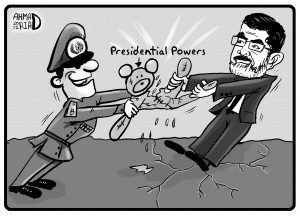
Egypt’s Supreme Administrative Court at the State Council had its plate full Tuesday with five fateful decisions resting on the head judge, Ali Fikri.
The court headquarters in Dokki were surrounded by dozens of armoured Central Security Forces conscripts as the court ruled on cases integral to Egypt’s transition to democracy.
In front of Fikri’s bench was: a case calling for the overturning of the Justice Minister’s decision to allow military personnel to arrest civilians; another calling for the dissolution of the Shura Council, the upper house of parliament; a call to reverse the decision of dissolving its lower house, the People’s Assembly; a call to dissolve the Constituent Assembly that is meant to be drafting Egypt’s next constitution; and finally a case which calls for the revocation of the military released and recent constitutional decree.
With the exception of the Justice Minister’s decision, which was overturned, the court postponed ruling on all of these cases to later dates.
The case calling for the continuation of the People’s Assembly will be decided on July 9. The case, which was filed by several Members of Parliament in the now dissolved PA, argues that the decision to dissolve it was invalid.
The Supreme Constitutional Court has ruled earlier this month that the parliamentary elections law that lead to the PA was unconstitutional since it did not give equal opportunity to independent and partisan candidates.Based on this decision the ruling Supreme Council of Armed Forces, in its capacity as acting president, dissolved the PA.
However, many MPs are arguing that the SCC only had the power to rule the electoral law illegal, not to dissolve the PA while others are saying that only a third of the PA seats, the third that was initially reserved for independent candidates but was later opened up to political parties, should be dissolved while the other two thirds should survive.
The Shura Council dissolution case is the polar opposite of what is involved in the People’s Assembly.
As a result of the SCC ruling on the unconstitutionality of the parliamentary elections law, a group of lawyers filed a case arguing that the upper house of parliament should follow in the footsteps of its lower house and be dissolved. The case has been postponed to July 10.
On the same day the court will also be ruling on the case filed against the recently release supplementary constitutional decree.
The decree, which was released by SCAF in the wake of the PA’s dissolution, severely limits the next president’s powers until a new constitution is written as well as giving SCAF full legislative powers and control over the constitution’s drafting process.
Plaintiffs are arguing that SCAF does not have the power to issue constitutional decrees while an elected parliament is sitting and that constitutional decrees are invalid without a popular referendum.
Finally, the court will be looking into the case filed against the Constituent Assembly next September 4.A previous assembly was dissolved by the same court for including members of parliament. The parliament is meant to choose members of the assembly but are not allowed to include themselves, the ruling said.
Parliament then formed another CA, a mere day before the PA’s dissolution. However, the second CA also included MPs which prompted another case against it.
Nonetheless, with the ruling set for September, the CA has been given a temporary reprieve.
It can possibly finish drafting the new constitution and hold a public referendum over it before the court date rendering a ruling against it moot.
The Assembly, chaired by Supreme Council of the Judiciary head Hossam El-Gheriany, met yesterday in the parliament building to discuss its rules and procedures.

